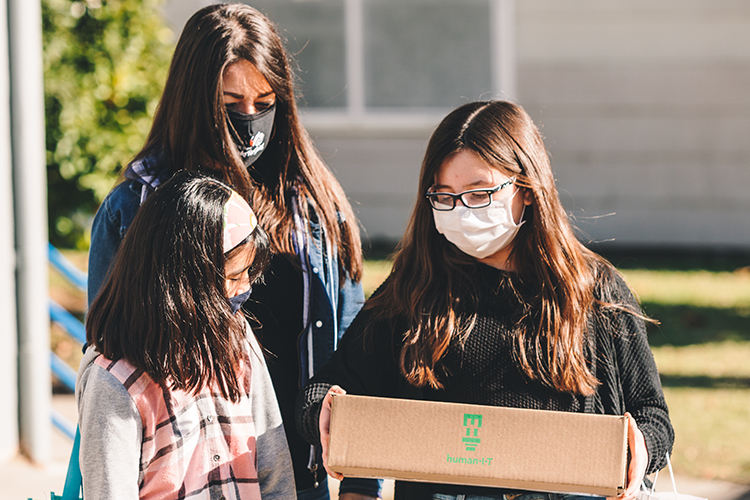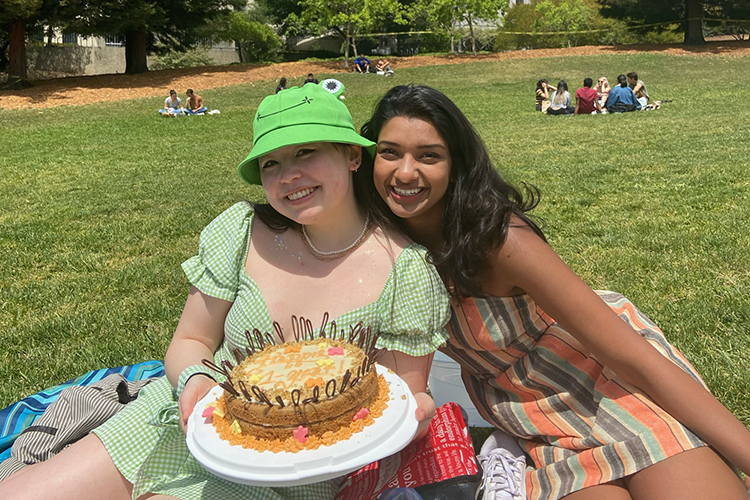COVID Stories: A free online camp? UC Berkeley students create a winner
Connect-In-Place, offering lively courses for youth isolated during the pandemic, now operates year-round
June 22, 2021

With $20,000 in donations, Connect-In-Place worked with human I-T, an organization that fixes up old electronics and distributes them to low-income people and nonprofits, to get free laptops and other technology to campers in need. (Photo courtesy of human I-T)
The COVID-19 pandemic has separated us, but sharing stories about how members of the campus community have been surviving — and even thriving — since spring 2020 can help draw us together. Berkeley News is gathering inspiring personal tales of heartache and triumph related to the coronavirus and will run them periodically. To pitch us your story, send a brief email to [email protected]. Check out the whole series here.
This is the 11th story in the series. It highlights Danielle Egan and Saumya Goyal, who graduated this spring from Berkeley with bachelor’s degrees in business administration.
Last summer, when UC Berkeley students Danielle Egan and Saumya Goyal launched Connect-In-Place, a free online summer camp, they hoped about 250 middle and high school students — sheltered in place during the pandemic— would attend. The two co-founders were ready, with more than 50 youth-friendly Zoom courses taught by college students that ranged from surviving high school to vector mechanics, crocheting, Punjabi folk dance, college admissions and trigonometry.
But triple that number enrolled in the first session, and 750 campers grew to 1,400 campers for the second. In response, Egan and Goyal added more courses — 56 grew to 140 — and found 30 more instructors to join the original 50.
This summer, Connect-In-Place is back, despite the easing of COVID-19 restrictions, with 715 students, 61 instructors and 82 classes for its first session. In fact, the camp hardly took a break, operating during the 2020-21 school year for three more sessions at the urging of families in the Bay Area and beyond.
Today, the program has reached nearly 4,000 youth through more than 450 courses taught by about 350 instructors.

“We were not expecting it to be as big as it was,” said Danielle Egan of the popularity of Connect-in-Place. “It was our first time running a nonprofit.” Despite COVID-19 restrictions easing in California, demand for the camp prompted co-founders Egan and Saumya Goyal to keep it running throughout the school year. (Photo by Jessica Ji)
Why is the startup so popular?
“First of all, we’re free, whereas most alternatives are not,” explained Egan, who, like Goyal, graduated this past May with a bachelor’s degree in business administrstion. “We’re also providing college student mentors. Kids enjoy learning from someone who’s relatable. They also may be more engaged with their instructor, in part, because the instructor goes to a college the student wants to attend.”
The volunteer teachers are from top schools that include all the UC campuses, MIT, University of Pennsylvania, Yale, Cornell, Stanford, Johns Hopkins, NYU and USC.
As for what they teach, “we keep it completely open-ended. We want instructors to teach what they’re passionate about, as that enthusiasm tends to be infectious for students” said Egan, adding that “we ask them to come up with a fun title that hooks students in.”
Course names have included Keep Your ‘Ion’ Chemistry, Learning to Think Like a Politician, How to Stop a Pandemic (Intro to Public Health), Becoming the Next Van Gogh (Intro to Drawing), Let’s Build a Website! and Stage Fright to TEDx Talk: Conquering Public Speaking Like a Boss.

Saumya Goyal co-founded Connect-in-Place last year. She says anyone on the fence about founding an organization should just “do it! You will learn so much and be really glad you did.” (Photo by Deeksha Goyal)
In addition to academics, Connect-In-Place offers, without charge, homework support in a number of disciplines, college prep guidance and courses to help foster healthy habits, financial literacy, empathy, resiliency from failure and stress management. There’s even a class where students just play interactive games together to destress and meet peers.
Each course is taught one or two times a week during a four-week session, runs an hour and is limited to about 10 students each. Campers can take up to six classes per session.
For those without laptops, the $40 that parents are invited to contribute per session is put toward buying them. So far, said Egan, Connect-In-Place has raised $20,000 through a GoFundMe account to purchase 63 laptops, along with hot spots and other digital tools, for campers from underserved communities. The distribution is through human-I-T, an organization that repairs and repurposes old electronics and provides them — along with Internet access and digital training — to low-income people and nonprofit groups. Another $20,000 currently is being raised through the GoFundMe account to help bridge the technology gap.
“Our main emphasis is accessibility, so if families can’t donate, we are fine with that. We just want students to attend stress-free,” said Goyal of the $40 fee. She added that Connect-In-Place also is cultivating donors to raise funds for more computers.
Suraya Fadel, a Berkeley alumna in Los Angeles whose daughter, Luz, 16, has taken Connect-In-Place classes every session so far, said the program helped her teen navigate the loss of in-person classroom interaction and engagement and one-on-one time with teachers. It also provided positive role models and mentors, Fadel said, and college and career advice.
“I was impressed by their mission. I could not believe upper college-tier students decided to step up, be proactive and give back to the younger generation or those less fortunate impacted in the pandemic,” she said. “I was impressed with their selfless giving, of helping students learn and be academically challenged.”

Connect-in-Place co-founders Danielle Egan (left) and Saumya Goyal celebrate the first anniversary of their startup on Memorial Glade with a cake made by Egan. (Photo by Victoria Brendel)
Goyal and Egan, who first met during Berkeley Haas’ undergraduate orientation session, thought up the camp during finals week in April 2020. They wanted to help combat the social isolation that tweens and teens were experiencing after schools and other youth activities shut down. The first name they chose for the camp they began designing was Learn-In-Place, but it became Connect-In-Place after adolescents told them they most wanted a program to connect them to peers.
The co-founders recruited instructors among their friends and from Project SMILE, a mentorship program on campus that pairs Berkeley students with local students at Longfellow and Willard middle schools for academic and emotional guidance. They also tapped college peers doing public service in youth education at other UCs and state schools and, as Connect-In-Place grew in popularity, at other top schools across the U.S.
One of them was Goyal’s sister, Deeksha, a Stanford graduate with a B.S. and an M.S. computer science who had belonged to student dance groups in college. She taught A Journey Through Bollywood Dance for Connect-In-Place, and “the experience was so positive that her students became friends, and they have weekly calls with my sister … where they hang out and play games,” said Saumya Goyal.
Sydney Fung, a Mountain View high school student, described the college students who taught her “Introduction to Journalism” and “Let’s Get Artsy” classes last summer as “super-relatable, really fun and welcoming. Since they’re so young, they’re able to engage the class more effectively and were great to get advice from.”
This summer, Fung and 30 other college students — some of them former Connect-In-Place campers — are camp interns, working as teachers’ assistants or project managers on the operations team. Fung is now a project manager for the public relations team, which produces a newsletter, does outreach to schools nationwide and handles social networking; high schoolers became a huge audience for Connect-In-Place through the camp’s TikTok account. Fung also has been paired, like all the interns, with a college student mentor from UCLA who shares some of her career interests, including journalism. All interns and mentors meet for a weekly 30-minute mentoring session.

Deeksha Goyal, whose sister, Saumya, co-founded Connect-in-Place, taught two remote sessions of Bollywood dancing to last summer’s campers. A Stanford University graduate with a B.S. and an M.S. in computer science, she also belonged to competitive student dance groups while a student there. (Photo by Saumya Goyal)
Connect-In-Place also offers community events that are open to all, including panel discussions on college tips, careers in science and medicine, standardized testing and other topics. Additional events include writing contests, an art contest and a talent show.
Egan and Goyal said they, too, have benefited from the camp through the experience of managing and marketing a startup just as they’re entering the workforce. Egan starts a job with LinkedIn next month, and Goyal is an incoming consultant at Deloitte.
“I had never founded a nonprofit or managed an organization of this magnitude before,” said Egan, “So, we had to build the ship as we sailed it. Now, we’ve become experts in our own little corner and are running much more efficiently.”
Said Goyal, “Running Connect-In-Place has been the best learning experience I could have ever been a part of. It allowed me to take the data and business skills I learned at Berkeley and apply them to the real world in a meaningful way, and I learned how to build processes and communicate clearly.”
The two alumnae also discovered that Connect-In-Place needs to stay in place, even after the pandemic. The program has the potential to partner with after-school programs at Title I schools where many students are in poverty, said Egan, and to be a model for Connect-In-Place chapters at other universities.
“Saumya and I had a lot of conversations about whether we should continue Connect-In-Place past COVID,” said Egan. “My mantra has always been to keep going as long as we’re needed, as long as we can help kids.”